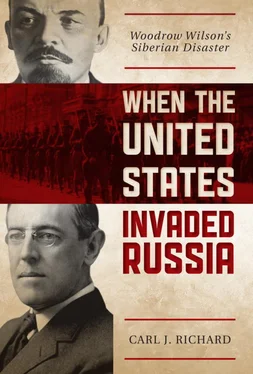The German War Prisoners Theory
The first theory regarding the Siberian intervention, advanced by Christopher Lasch, maintains that Wilson decided to intervene because he was frightened by persistent rumors that armed war prisoners working for the Central Powers were securing control of Siberia. There were approximately 800,000 German and Austro-Hungarian prisoners of war in Siberia when the Bolsheviks signed an armistice with the Central Powers in December 1917, just one month after overthrowing the Provisional Government. Less than one-tenth of these prisoners were German, though the Allies referred to them repeatedly as “German prisoners.” The Bolsheviks managed to convert a few thousand prisoners, virtually none of whom were German, to their communist ideology and to utilize them in the Red Army. [3] Christopher Lasch, “American Intervention in Siberia: Reinterpretation,” Political Science Quarterly 77 (June 1962): 219–20; George F. Kennan, Russia and the West under Lenin and Stalin (Boston: Little, Brown, 1960), 95–96.
The Bolshevik practice of arming these prisoners created problems when the State Department began receiving a growing number of erroneous reports claiming that prisoners were being armed on a far greater scale than was in fact the case. These prisoners, it was alleged, were being led by German officers and were acting for Germany. They might attempt either to seize strategic points in Siberia or to capture the 700 tons of Allied supplies, worth an estimated $750 million to $1 billion, located at the Pacific port of Vladivostok. These supplies, a monument to the inefficiency of the czarist and provisional governments that had never paid for them, lay strewn along the docks and stacked in open fields, exposed alike to environmental and criminal elements. The quantities of these supplies staggered the imagination: a mountain of cotton bales, millions of rounds of ammunition, 37,000 train wheels, enough steel rails to build a third track from Vladivostok to Petrograd, and enough barbed wire to fence Siberia. Not to mention one lonely and rather mysterious submarine. [4] Carl W. Ackerman, Trailing the Bolsheviki: Twelve Thousand Miles with the Allies in Siberia (New York: Charles Scribner’s Sons, 1919), 42; Kennan, Russia and the West under Lenin and Stalin , 93; Arthur S. Link, ed., The Papers of Woodrow Wilson (Princeton, N.J.: Princeton University Press, 1966–1994), Lord Arthur Balfour to Lord Reading, February 26, 1918, vol. 46, 472; Memorandum of Breckinridge Long, March 2, 1918, vol. 46, 514; Frank L. Polk to Wilson, March 6, 1918, vol. 46, 554–55; James William Morley, The Japanese Thrust into Siberia, 1918 (New York: Columbia University Press, 1957), 38.
Lasch’s contention that Wilson believed these war prisoner stories ignores the two key factors that caused the president to doubt their accuracy. First, many knowledgeable officials flatly contradicted the rumors. On March 2, 1918, the State Department asked Willing Spencer, U.S. chargé d’affaires in China, to order Lieutenant Colonel William S. Drysdale to “proceed westward towards Irkutsk if he considers it safe to do so and report facts as to situations verifying or correcting rumors of the arming of German prisoners.” On March 16, Spencer transmitted Drysdale’s report that the prisoners were properly guarded. “Little probability of prisoners being armed,” he declared. [5] U.S. Department of State, Papers Relating to the Foreign Relations of the United States, Russia, 1918 (Washington, D.C.: Government Printing Office, 1931–1932; reprint, New York: Kraus, 1969), Frank L. Polk to Willing Spencer, March 2, vol. 2, 63–64; Willing Spencer to Robert Lansing, March 16, vol. 2, 80.
Further evidence of the falsehood of the war prisoner rumors arrived in the form of the Webster-Hicks reports. In March, Colonel Raymond Robins, head of the American Red Cross Commission in Russia, and British envoy R. H. Bruce Lockhart sent an American and a Briton, Captains William B. Webster and W. L. Hicks, to investigate the war prisoner allegations. Important aspects of the Webster-Hicks reports were then transmitted to the State Department by U.S. Ambassador to Russia David R. Francis in a series of reports the following month. Webster and Hicks, who traversed the western part of Siberia unvisited by Drysdale, concluded in the most unequivocal terms that there was no cause for alarm. The few thousand armed prisoners were ardent socialists operating under Bolshevik officers and were despised by their former officers, who were compiling lists of these “traitors.” The Soviet Government even offered to limit the arming of war prisoners to 1,500 men and to allow Allied consuls to investigate periodically to ensure the enforcement of the limit. Webster and Hicks concluded that “if there is an arming of prisoners of war on a large scale it is a mystery where the arming is taking place and where the prisoners are being kept.” Thus, General William S. Graves, Commander of the American Expeditionary Force in Siberia, wrote in his memoirs, “It is difficult to understand why the United States sent representatives to get certain specific information about war prisoners, and then decided to send troops to Siberia to frustrate any action taken by organizations of German and Austrian war prisoners which United States representatives said did not exist.” The answer to this question, of course, is that the United States did not send troops to Siberia because of war prisoner rumors. [6] Ibid., David R. Francis to Robert Lansing, April 2, vol. 2, 96; April 13, vol. 2, 123; April 18, vol. 2, 125; April 22, vol. 2, 131; C. K. Cumming and Walter W. Pettit, eds., Russian-American Relations: March 1917–March 1920: Documents and Papers (New York: Harcourt Brace, 1920; reprint, Westport, Conn.: Hyperion, 1977), 124, 166–68, 177, 179–82; R. H. Bruce Lockhart, British Agent (New York: G. P. Putnam’s Sons, 1933), 248–49; William S. Graves, America’s Siberian Adventure, 1918–1920 (New York: Cape and Smith, 1931), 26.
At least three other highly trusted men corroborated the reports of Drysdale, Webster, and Hicks. U.S. Ambassador to Japan Roland S. Morris reported on March 7, 1918, concerning one wild story about the prisoners, “I have traced this rumor to French sources, and therefore doubt its accuracy, as most of the alarming rumors in reference to Siberia during the last two months have [the] same origin.” The source for many of these stories was the French Consul-General at Irkutsk, an anti-Bolshevik with the ironic name of Gaston Bourgeois. Other sources included the French embassy in Russia and an anti-Bolshevik general. On April 10, U.S. Minister to China Paul S. Reinsch added, “There is no evidence of a concerted plan on the part of the Germans to control Siberia through the prisoners of war nor could such an attempt succeed. Earlier reports about armed war prisoners were exaggerated; most of these reports came from one source in Irkutsk.” Perhaps even more influential was Morris’s April 13 account regarding Czech leader Thomas G. Masaryk, who had just traveled the length of Siberia and knew the conditions there. Masaryk found no evidence of the existence of a substantial number of armed German or Austrian prisoners in Siberia. [7] U.S. Department of State, Foreign Relations, Russia, 1918 , Roland S. Morris to Robert Lansing, March 7, vol. 2, 71; April 13, vol. 2, 122; Paul S. Reinsch to Robert Lansing, April 10, vol. 2, 117. For reference to the sources of the rumors, see Willing Spencer to Robert Lansing, March 6, vol. 2, 70; John F. Stevens to Robert Lansing, May 30, vol. 2, 181–82; David R. Francis to Robert Lansing, June 14, vol. 2, 211.
Second, Lasch’s theory ignores the fact that Wilson knew that the armed war prisoners could not be acting under the direction of Germany because the Germans were clearly upset with the Bolsheviks for arming them. On April 17, Ambassador Francis reported that Germany was disturbed by war prisoner activity in Siberia. On April 22, Francis’s assertion was supported by the U.S. Consul-General in Moscow, Maddin Summers, who wrote that the Germans were demanding that the Soviet government halt the arming of war prisoners immediately. Since both Francis and Summers made no secret of the fact that they were ardent anti-Bolsheviks, their reports could not be discounted easily. On April 25, Reinsch concurred with them, saying that the Germans were “apparently alarmed at the spread of Bolshevik allegiance among prisoners.” In fact, U.S. Consul in Vladivostok John K. Caldwell referred to the armed war prisoners as “internationalists” and U.S. Consul in Irkutsk Ernest L. Harris referred to them as “revolutionists.” Both Caldwell and Harris were also passionate anti-Bolsheviks. [8] Ibid., David R. Francis to Robert Lansing, April 17, vol. 2, 125; Maddin Summers to Robert Lansing, April 22, vol. 2, 129–30; Paul S. Reinsch to Robert Lansing, April 25, vol. 2, 137; John K. Caldwell to Robert Lansing, June 14, vol. 2, 210; Ernest L. Harris to Robert Lansing, June 20, vol. 2, 217.
Читать дальше












